Ten years ago, Zhang Yiming founded ByteDance (hereinafter referred to as Byte). At that time, people would not have thought that this unknown Chinese company would fissionally produce many explosive mobile applications in the future.
“Meaning Duanzi”, “Today’s Toutiao” and even “Douyin”, the overlord of the domestic short video field today, are all proofs of the ability of byte explosions. The overseas version of Douyin TikTok is undoubtedly the most successful product of Chinese companies going overseas so far.
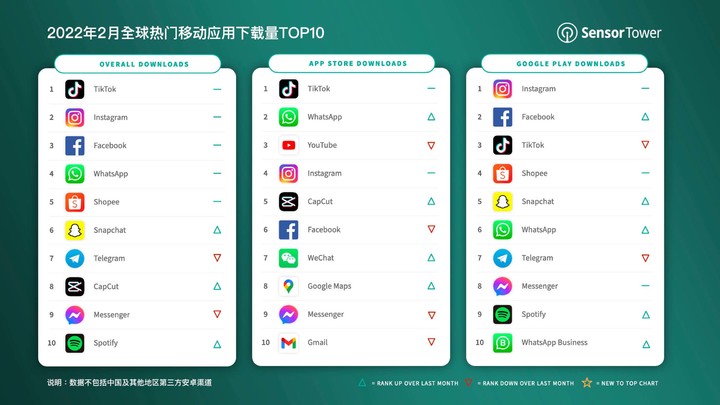
▲ Source of app downloads in February 2022: SensorTower
In the fast-changing world of the Internet, standing still means going backwards. The scale of Douyin’s domestic user group has gradually peaked, and it is difficult for the domestic short video field to gain a larger market. Therefore, in the past few years, Byte has also continuously expanded its boundaries and tried to create the next traffic support product.
And music streaming media, whether from the domestic or foreign market, is a “red sea” that is difficult to make a splash. The four foreign platforms of Spotify , Apple Music , Amazon Music and YouTube Music have developed for many years and have a large number of music copyrights and paid users. On the other hand, Tencent Music and NetEase Cloud Music occupy the vast majority of the domestic music market with the status of “one super and one strong”.
How does Bytes challenge these giants who have been working in the music market for many years? The launch of Soda Music is an important step.
The notes in the Douyin icon are the musical genes of bytes
Douyin has been inseparable from music since its birth. The predecessor of Douyin was A.me , and its positioning was “short music video”, which was very similar to musical.ly , which was popular among American teenagers at that time.
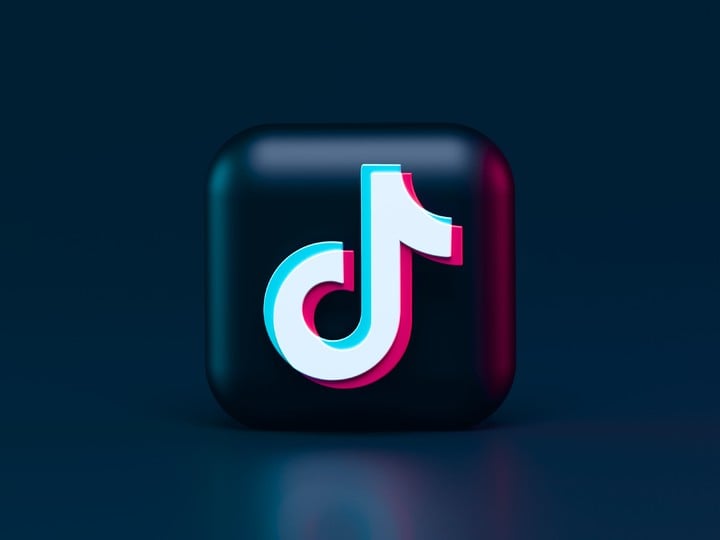
▲ In the vibrato icon is a note source: unsplash
musical.ly is a Chinese company founded in 2014. It has accumulated a large number of young users in Europe and America by guiding users to lip-sync or dance to music to create short videos.
According to statistics, by the end of 2017 musical.ly had more than 200 million registered users. musical.ly was acquired by Byte in 2017, and was later incorporated into Douyin’s overseas version of TikTok , bringing a large number of active users and creators to TikTok , which also laid the foundation for TikTok ’s rapid global expansion.

▲ musical.ly interface, featuring 15s short videos combined with music
Domestic Douyin has gained a large number of young users who love music by sponsoring music variety shows, and has firmly grasped its advantages to dive into more user groups by introducing celebrity Internet celebrities and sponsoring the Spring Festival Gala.
Today’s Douyin is still inseparable from music, and the “Douyin Divine Comedy” born on the Douyin platform has become the most widely spread musical element on the Internet. On various platforms of the domestic network and even offline, people will hear the explosive music on Douyin.
In March 2020, Byte first officially launched the music playback software Resso in India and Indonesia, and achieved rapid growth in the following six months.
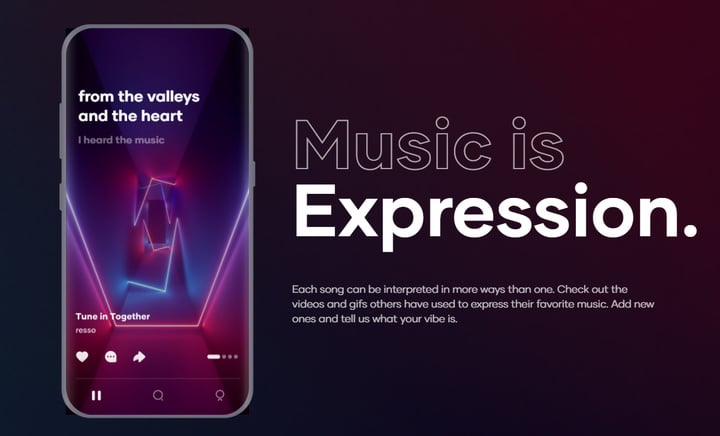
▲ Resso official website demo screen
However, Resoo did not further expand its territory to the market in more countries in the following two years, and its current open areas are only three countries: India, Indonesia and Brazil.
Although Resso ranks among the top in the downloads of music apps in these countries, it is hard to say how impressive Resso ‘s results are for Bytes. Spotify , Apple Music , etc., which have been working in the field of music streaming for many years, still firmly occupy most of the market share of overseas music streaming, and Tencent, which holds a large number of music copyrights, is also ambitious for the overseas market.
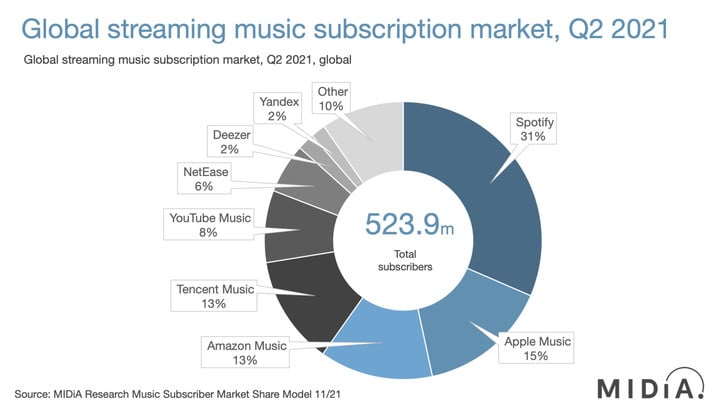
▲ The global music streaming market share in the second quarter of 2021 given by MIDiA Research. Image from: MIDiA
Soda Music, what’s the difference?
In mid-December 2021, “Soda Music” developed by Byte first appeared in the media field of vision. But because it is only limited to a small-scale internal test, the public can only hear its voice and see its appearance.
In March, “Soda Music” was launched on the domestic app store, and more invitation codes were released one after another to start a large-scale internal test, so today we finally have the opportunity to experience this new music app.
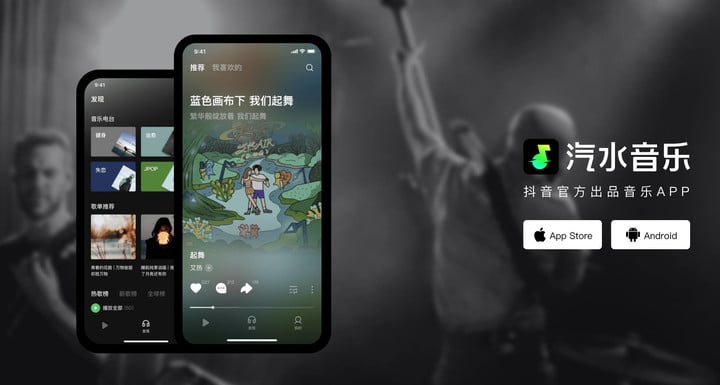
▲ “Soda Music” official website homepage
1. User experience
When registering for the first time, “Soda Music” will remind the user to select the preferred music style and language, so that after completion, it can recommend the music type that is close to the user’s preference.
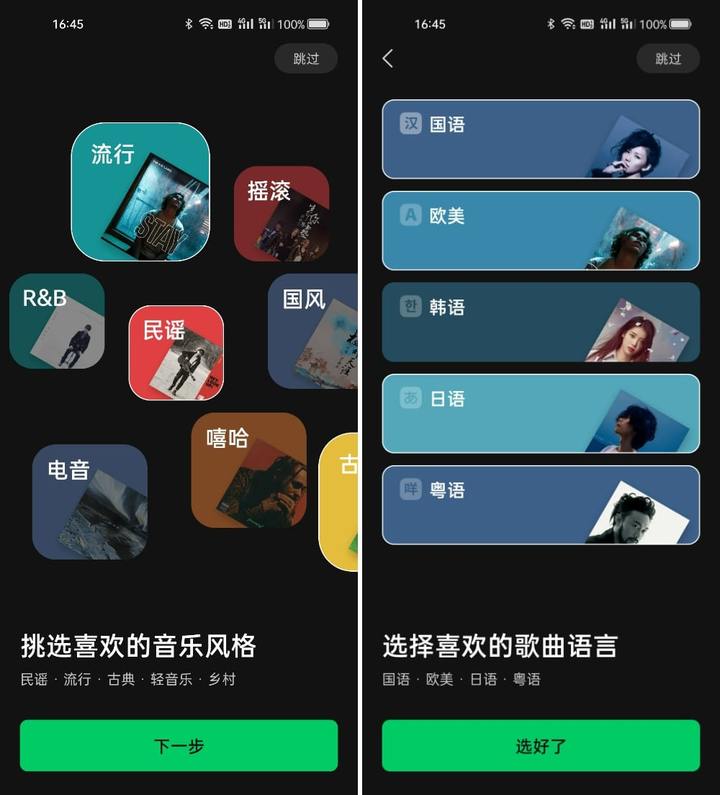
▲ After registering an account, “Soda Music” will remind users to choose the type of music they like
Entering the main interface, the interface of “Soda Music” is highly similar to Resso , both of which are different from the interaction methods of mainstream music players on the market, and choose the up and down sliding logic similar to Douyin to switch songs.
Compared with the traditional left and right button switching, the interaction of up and down obviously greatly improves the speed of song cutting, so that listening to songs can be quickly browsed without pressure like a short video, and the algorithm can also obtain larger samples in the same time. It can push songs to users more accurately.
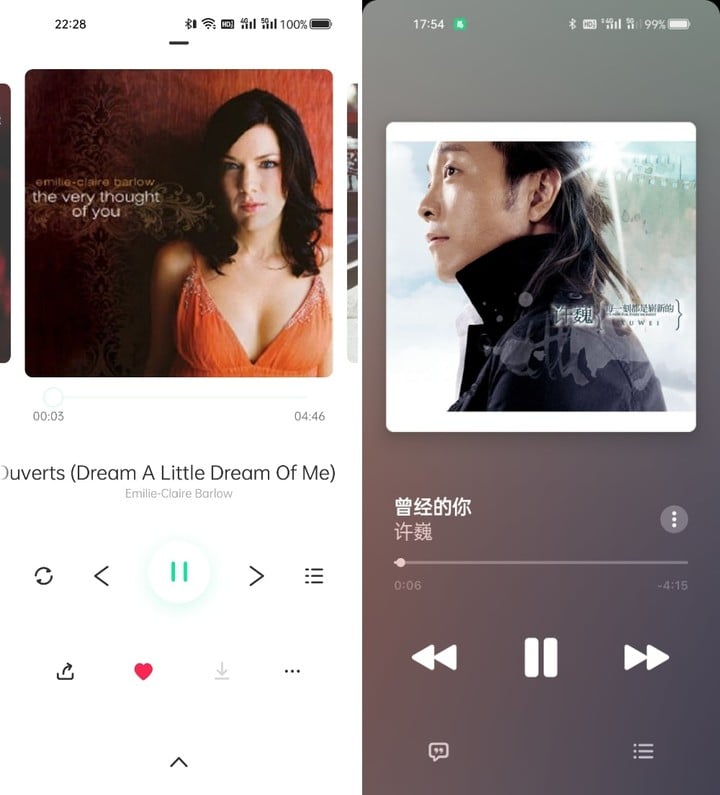
▲ Traditional music playback interface: Douban fm on the left, Apple Music on the right
After swiping up and down to switch songs, the song cover also changes from a card style to immersively integrated into the center of the screen, and the lyrics scroll in real time with the progress of listening to the song above the cover. Click the lyrics area to enter the lyrics page.
At the bottom left of the cover are Douyin-like “Like”, “Comment” and “Share” buttons, while at the bottom right are the “Play Queue” and a multi-function entry that includes song downloads, join playlists, and more.
The top right corner of the entire music playing interface is the search button. In contrast, traditional music playing software often needs to return to the home page to search.
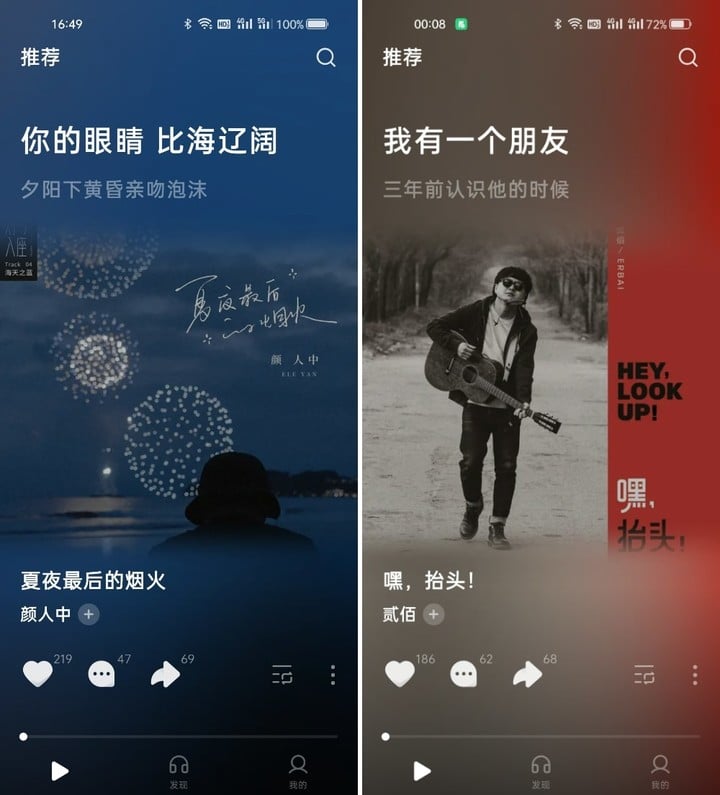
▲ “Soda Music” music player main interface
In the “Play Queue” of the song playback interface, you can see the songs recommended by the algorithm to be played later, and there will be a small text prompt “the more you listen, the more recommended”, so the songs to be played will follow the user’s Switching between songs is constantly updated.
The recommendation of “Soda Music” is divided into three levels: the default recommendation based on user preferences and historical behavior, the search-based recommendation and the radio-based recommendation.
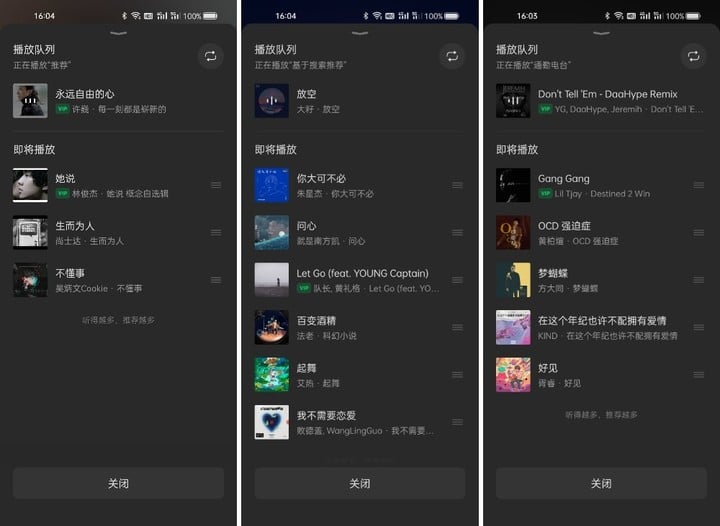
▲ Song recommendation of “Soda Music”
The navigation bar at the bottom of Soda Music is divided into three parts, corresponding to three different function pages. By default, it is the “Music” page that automatically plays songs after entering the program. In the middle is the discovery page, from top to bottom are “Music Radio”, “Playlist Recommendation” and song list.
“My” is to enter the personal information page, where you can view your favorite music, favorite playlists and albums, as well as download and play history.
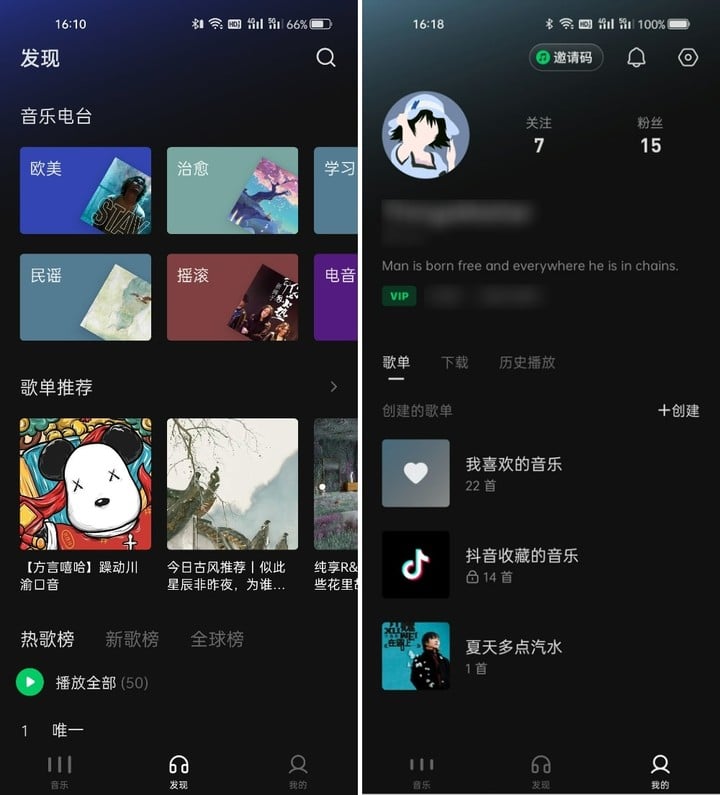
▲ The discovery page and personal information page of “Soda Music”
2. Sync with Douyin
You may have noticed a playlist of “Music from Douyin Collection” on your personal information page.
Also as a product of Byte, most of the data of “Soda Music” and Douyin are synchronized. Music in Douyin Collection can be seen in Soda Music, and vice versa. In addition, users’ attention and fans are also synchronized with Douyin.
However, there are some problems with the synchronization of music. Some songs in the Douyin collection are grayed out in “Soda Music” and cannot be played; while some songs that can be played in the full version in “Soda Music” can only be listened to in Douyin For the first 30s, the prompt needs to be in “Soda Music” to listen to the full version.
For example, clips of Jay Chou’s songs that can be played in Douyin cannot be played in “Soda Music” (there are only a few songs by Jay Chou and other singers in “Soda Music” for the time being, but no singles); even if the same Songs, the song clips in the Douyin collection cannot be played in “Soda Music”, but the full version can be played again.
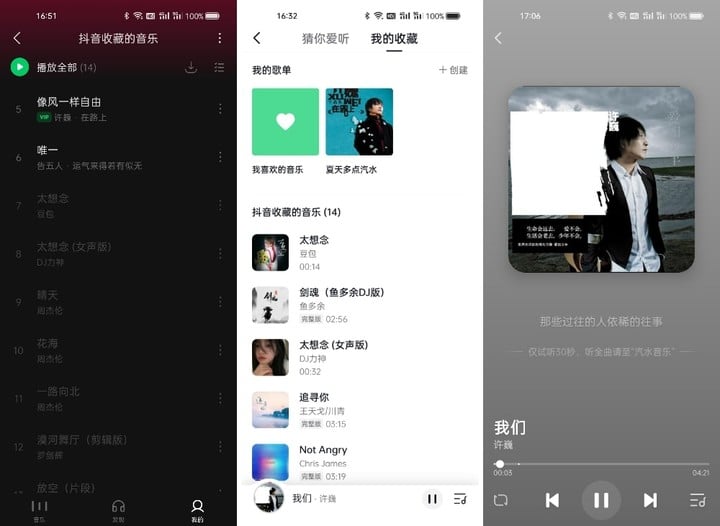
▲ “Soda Music” and the Douyin playlist are synchronized, but the available music libraries of the two are not exactly the same
Because “Soda Music” is still in the closed beta stage, it is not yet certain whether the problem will continue to exist in the future.
3. The “pure heterogeneity” of domestic music apps
The competition in the domestic music market is fierce, and the previous music copyright war caused Tencent, NetEase, etc. to spend a lot of money to buy music copyrights.
In a copyright battle that has lasted for several years, Xiami Music announced its closure in early 2021. From now on, there are only two major factions left in the Chinese music market: Tencent and NetEase Cloud Music. The copyright dispute also ended on July 24, 2021 with the State Administration for Market Regulation’s decision to punish Tencent’s exclusive copyright.
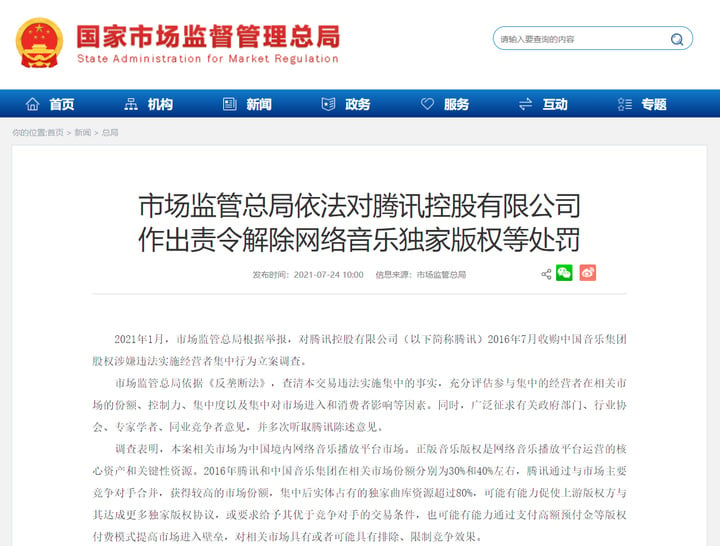
▲ The end of the exclusive copyright of online music
High music copyright fees make it difficult for domestic online music platforms to rely solely on membership services to achieve profitability.
Tencent Music has absorbed a large number of paying users thanks to its rich music library. At the same time, it has also actively expanded its music-related business and has achieved profits for several years, while NetEase Cloud Music, which has a smaller market share, has been losing money for many years.
It can be found that domestic QQ Music, Kugou, Kuwo Music and Netease Cloud Music do not only have pure music listening function like foreign music software, but are packed with live broadcast, short video, community and many other elements to enhance the performance of music. Retain user traffic for further monetization.
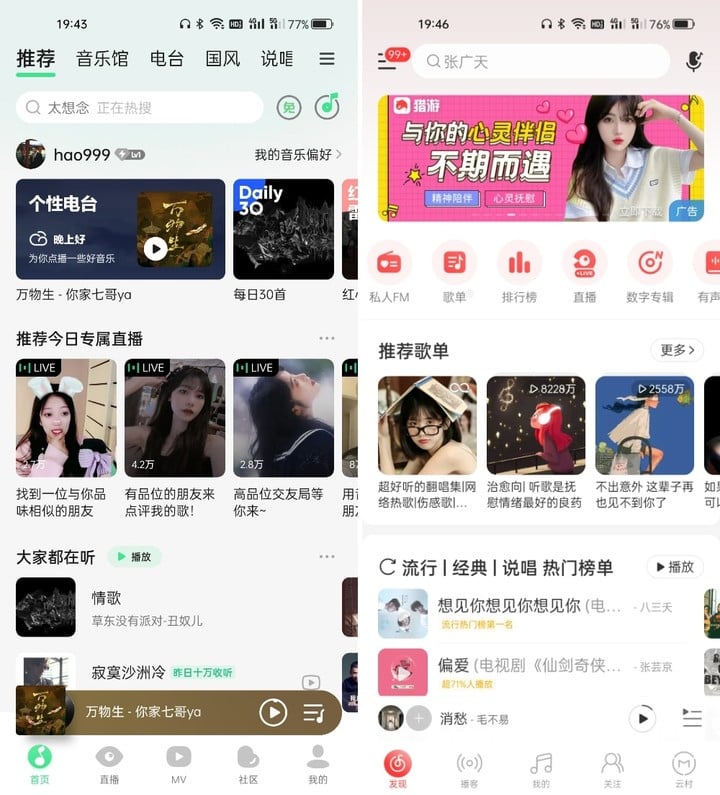
▲ The two major domestic camps of music apps that are “not coming”
And “Soda Music” seems to have maintained considerable restraint at this stage, and there is basically no interference from unrelated elements of music.
4. Music library, hard to beat Tencent
In terms of music copyrights, “Soda Music” claims to have tens of millions of music libraries, but it is still insufficient compared to Tencent’s huge music library capacity. For example, like NetEase Cloud Music, it does not have the copyright of Jay Chou’s singles, and when Mr. A searches for some singers or songs, occasionally the works cannot be found.
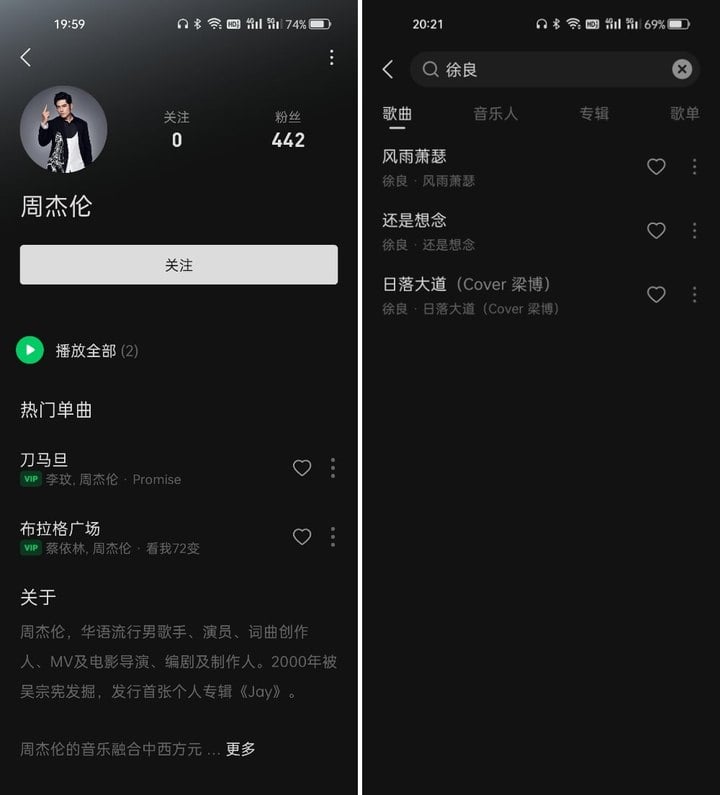
▲ The current music library of “Soda Music” is still insufficient
“Soda Music” may not need to be a music software with the most comprehensive music library.
Users who use Douyin can seamlessly listen to the songs they have collected on Douyin on “Soda Music”, and find more favorite songs in byte’s powerful algorithm recommendation.
For those who just want to enjoy music aimlessly, Soda Music’s clean interface makes the process even more enjoyable.
Music, Ignite Short Video
Douyin came out of the short video battlefield and took the first throne, but today it is not easy to sit back and relax. Tencent once vigorously promoted Weishi to compete in the short video track, but did not gain much market share in the end. Even in the face of Waterloo, Tencent’s ambition to develop short videos is still vigorous with the huge traffic pool of “national software” WeChat.
Under the situation that offline concerts cannot be held in various places due to the epidemic, the WeChat video account has attracted a large number of WeChat users to use the video account by virtue of online concerts. Wechat has invited Xicheng Boys one after another. On Mayday, Cui Jian held an online concert, and the cumulative number of viewers exceeded 10 million times. This shows the strong communication ability of the video account in the WeChat ecosystem, and this undoubtedly contributes to the peak growth of Douyin. came the pressure.
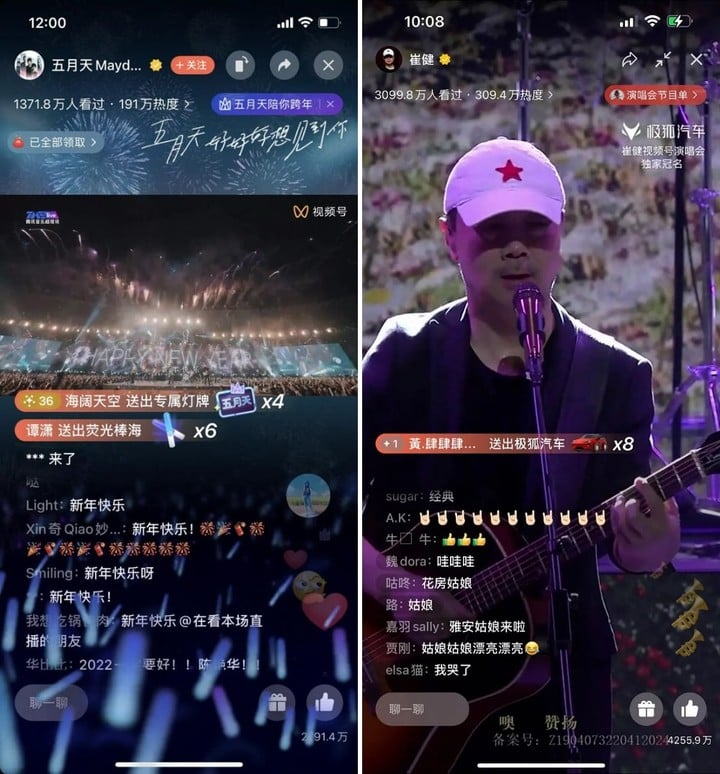
▲ Mayday and Cui Jian held an online concert on the WeChat video account, the screenshots are from the Internet
Perhaps the significance of the birth of “Soda Music” is to keep the raging flame of Douyin short videos burning.
Douyin has consistently proven its ability to create music hits in the past. By building a music platform, Douyin can give full play to the platform’s advantages and produce more exclusive high-quality music content, which in turn further stabilizes Douyin’s position in the short video field. At the same time, the development of a separate music platform can also improve the cultural and entertainment coverage of Bytes and help to form a more complete ecosystem.
Summarize
ByteDance means that the information in the Internet changes rapidly. Only by moving forward can we gain an advantage and survive in the cruel market.
Music can be described as an excellent carrier to connect with different countries, nations and groups. People’s bodies will move with the beat, and emotions will resonate with the melody, and the platform that leads the music trend will naturally gain a large number of users. The rise of Douyin in the past is inseparable from music, and the future of Douyin’s steady development is inseparable from the assistance of music.
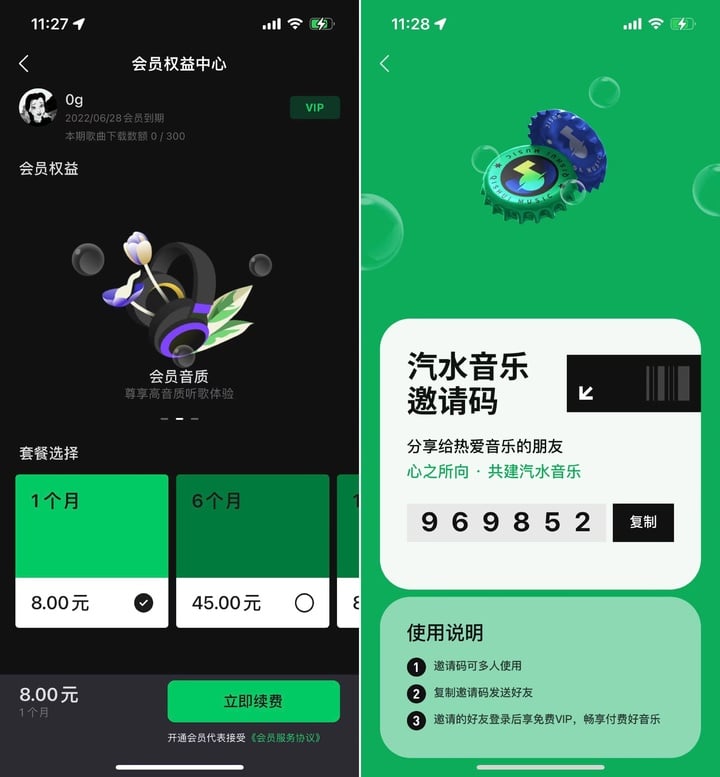
“Soda Music” is currently in the closed beta stage, and an invitation code is required to register.
After successful registration during the closed beta period, a two-month membership will be given away. The price of full membership is 8 yuan/month, 45 yuan/half year, 88 yuan/year.
If you want to experience, you can go to the app store to download, you are also welcome to share the invitation code in the comment area.

This article is reprinted from: https://www.ifanr.com/app/1483431
This site is for inclusion only, and the copyright belongs to the original author.